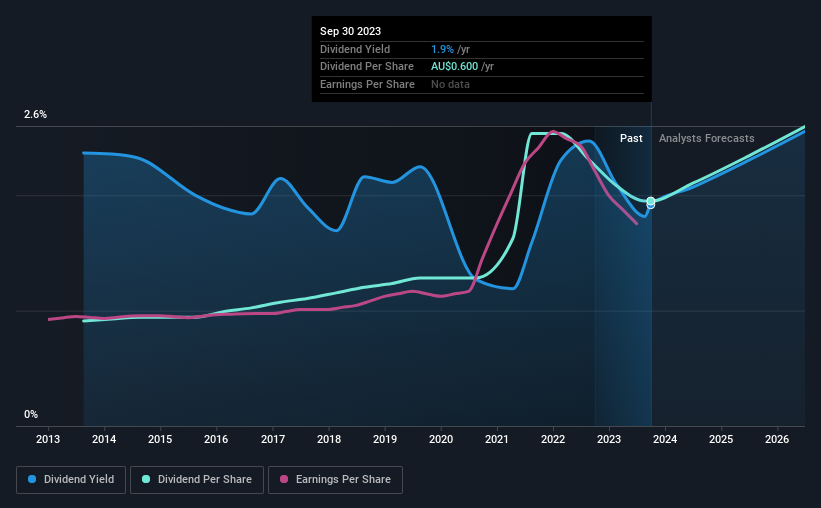Income Investors Should Know That ARB Corporation Limited (ASX:ARB) Goes Ex-Dividend Soon
It looks like ARB Corporation Limited (ASX:ARB) is about to go ex-dividend in the next four days. The ex-dividend date is one business day before a company's record date, which is the date on which the company determines which shareholders are entitled to receive a dividend. The ex-dividend date is of consequence because whenever a stock is bought or sold, the trade takes at least two business day to settle. Accordingly, ARB investors that purchase the stock on or after the 5th of October will not receive the dividend, which will be paid on the 20th of October.
The company's next dividend payment will be AU$0.30 per share. Last year, in total, the company distributed AU$0.60 to shareholders. Based on the last year's worth of payments, ARB has a trailing yield of 1.9% on the current stock price of A$31.28. Dividends are a major contributor to investment returns for long term holders, but only if the dividend continues to be paid. That's why we should always check whether the dividend payments appear sustainable, and if the company is growing.
Check out our latest analysis for ARB
Dividends are typically paid out of company income, so if a company pays out more than it earned, its dividend is usually at a higher risk of being cut. ARB paid out more than half (57%) of its earnings last year, which is a regular payout ratio for most companies. Yet cash flows are even more important than profits for assessing a dividend, so we need to see if the company generated enough cash to pay its distribution. The company paid out 102% of its free cash flow over the last year, which we think is outside the ideal range for most businesses. Companies usually need cash more than they need earnings - expenses don't pay themselves - so it's not great to see it paying out so much of its cash flow.
While ARB's dividends were covered by the company's reported profits, cash is somewhat more important, so it's not great to see that the company didn't generate enough cash to pay its dividend. Were this to happen repeatedly, this would be a risk to ARB's ability to maintain its dividend.
Click here to see the company's payout ratio, plus analyst estimates of its future dividends.
Have Earnings And Dividends Been Growing?
Stocks in companies that generate sustainable earnings growth often make the best dividend prospects, as it is easier to lift the dividend when earnings are rising. If business enters a downturn and the dividend is cut, the company could see its value fall precipitously. For this reason, we're glad to see ARB's earnings per share have risen 11% per annum over the last five years. Earnings have been growing at a decent rate, but we're concerned dividend payments consumed most of the company's cash flow over the past year.
Many investors will assess a company's dividend performance by evaluating how much the dividend payments have changed over time. In the last 10 years, ARB has lifted its dividend by approximately 7.9% a year on average. We're glad to see dividends rising alongside earnings over a number of years, which may be a sign the company intends to share the growth with shareholders.
Final Takeaway
From a dividend perspective, should investors buy or avoid ARB? Earnings per share growth is a positive, and the company's payout ratio looks normal. However, we note ARB paid out a much higher percentage of its free cash flow, which makes us uncomfortable. Overall we're not hugely bearish on the stock, but there are likely better dividend investments out there.
Ever wonder what the future holds for ARB? See what the nine analysts we track are forecasting, with this visualisation of its historical and future estimated earnings and cash flow
Generally, we wouldn't recommend just buying the first dividend stock you see. Here's a curated list of interesting stocks that are strong dividend payers.
Have feedback on this article? Concerned about the content? Get in touch with us directly. Alternatively, email editorial-team (at) simplywallst.com.
This article by Simply Wall St is general in nature. We provide commentary based on historical data and analyst forecasts only using an unbiased methodology and our articles are not intended to be financial advice. It does not constitute a recommendation to buy or sell any stock, and does not take account of your objectives, or your financial situation. We aim to bring you long-term focused analysis driven by fundamental data. Note that our analysis may not factor in the latest price-sensitive company announcements or qualitative material. Simply Wall St has no position in any stocks mentioned.

